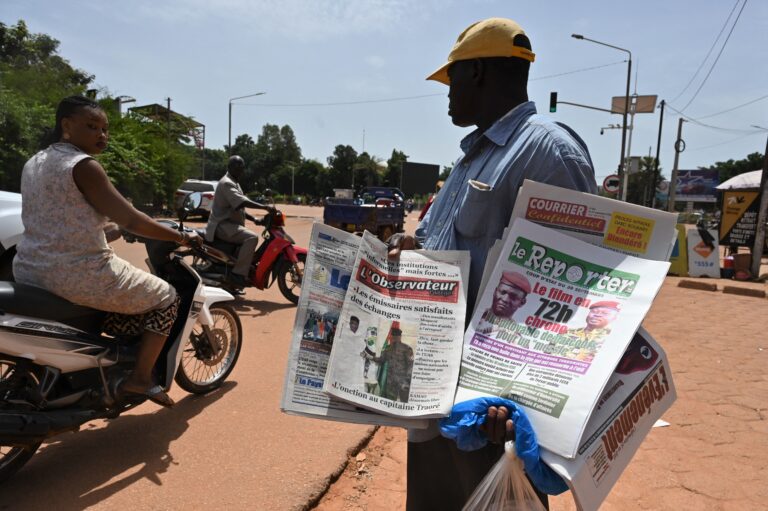(RSF/IFEX) – The following is an RSF press release: **Updates IFEX alerts of 18 January 1999, 22 December, 16 December and 15 December 1998** Paris, 7 May 1999 For immediate release Press Release Burkina Faso: Norbert Zongo case The Independent Commission of Inquiry in which Reporters sans frontières participated has submitted its report to the […]
(RSF/IFEX) – The following is an RSF press release:
**Updates IFEX alerts of 18 January 1999, 22 December, 16 December and 15
December 1998**
Paris, 7 May 1999
For immediate release
Press Release
Burkina Faso: Norbert Zongo case
The Independent Commission of Inquiry in which Reporters sans frontières
participated has submitted its report to the authorities.
“Norbert Zongo was assassinated for purely political motives because he
practiced investigative journalism. He defended a democratic ideal and had
chosen to become involved, with his newspaper, in the struggle for the
respect of human rights and justice, and against the poor management of the
public sector and impunity.”
“As for the authors of this crime, the Independent Commission of Inquiry has
not found the necessary proof to identify the culprits. It has found,
however, a number of contradictions and credibility gaps in the testimony of
a number of individuals with regard to their whereabouts on 13 December
1998.”
These conclusions are drawn from the thirty-five page report which the
Independent Commission of Inquiry submitted today, Friday, 7 May 1999, to
Burkina Faso Prime Minister Kadré Désiré Ouedraogo. This Commission, set up
on 7 January by presidential decree, had been given four months to inquire
into the circumstances surrounding Norbert Zongo’s death.
On 13 December 1998, close to the village of Sapouy, located some one
hundred kilometres south of Ouagadougou, Norbert Zongo died in suspicious
circumstances. The journalist’s charred corpse and those of his three
travelling companions were found inside a 4×4 vehicle. The public in Burkina
Faso quickly determined that this had not been an accident, and held
demonstrations demanding that the circumstances surrounding the death of the
editor-in-chief of L’Indépendant newspaper be made clear. Norbert Zongo was
an investigative reporter and had led a number of inquiries which proved
embarassing to a number of individuals close to circles of power.
The Independent Commission of Inquiry’s report makes a number of
recommendations to authorities. Notably, it asks that a “judicial follow-up
to the conclusions of the inquiry be initiated and that the necessary
financial and material means be allocated to the magistrate in charge of the
case.” The Commission also asks that “the protagonists of the Burkina Faso
political scene act responsibly and serenely, ensuring that a fair
conclusion be reached in the inquiry into the death of Norbert Zongo and his
three travelling companions; a conclusion that everyone should aspire
towards.”
After having organised a number of hearings, drawn on expertise and had a
number of confrontations, the Independent Commission of Inquiry does not put
forth the names of guilty parties but instead provides a list of “likely
suspects.” The names of six soldiers belonging to the Presidential Security
Regiment (Régiment de sécurité présidentielle, RSP) are put forward.
The full report of the Independent Commission of Inquiry is available on
Reporters sans frontières’ web site: www.rsf.fr


